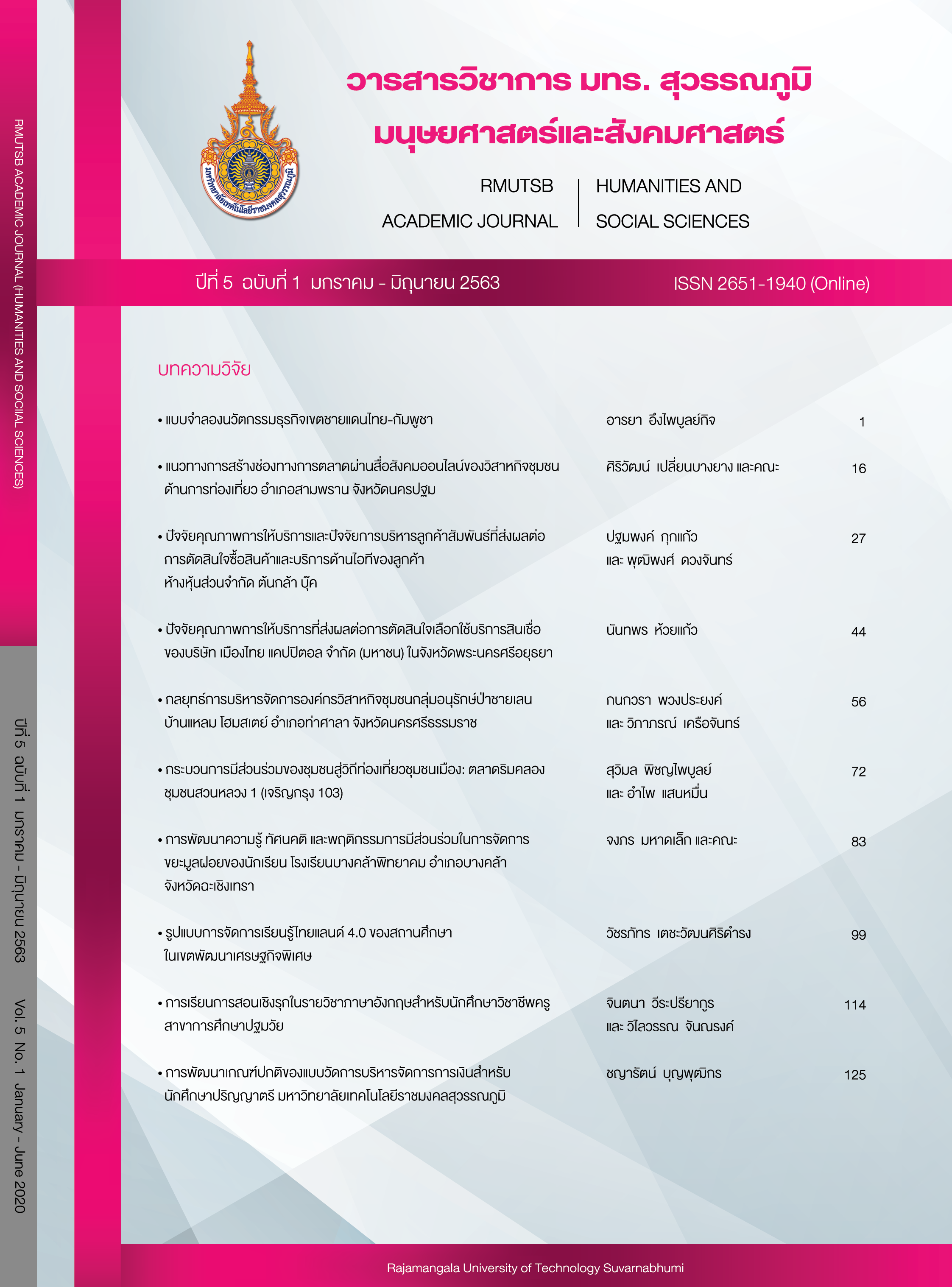Development of a norm of financial management test for undergraduate students of Rajamangala University of Technology Suvarnabhumi
Main Article Content
Abstract
The purpose of this research was to develop the norm of financial management test form for undergraduate students of Rajamangala University of Technology Suvarnabhumi. The samples were from 600 undergraduate students using a simple random sampling method in accordance with the proportion of the study. The instrument used in this research was the financial management test. Data were analyzed using descriptive statistics including percentage, mean and standard deviation. The norm was developed by converting raw scores into the percentile rank, Z-score, T-score, and Stanine.
The results showed that the students had financial management behaviors at a moderate level (=2.89). When considering each aspect, it was found that general financial management had the highest average
(=3.16), followed by capital accumulation (
=3.06), risk management (
=2.94), cash management or spending (
=2.80), saving or retirement planning (
=2.79), and credit management (
=2.62), respectively. The norm of financial management test scores were ranging from T30.8 to T78.27 (PR0 to PR99.60), which were divided into 5 levels of financial management behaviors, very good, good, moderate, rather bad, and bad, respectively.
Article Details
References
Bank of Thailand. (2013). Economic issues in year 2013. Retrieved 31 August 2017, from https://www.bot.or.th/Thai/MonetaryPolicy/EconomicConditions/AnnualReport/AnnualReport/Annual_Y56_T.pdf (in Thai)
Chanchana, C. (2009). Development of a multidimensional learning strategies scale for upper secondary school students (Doctoral dissertation). Chulalongkorn University, Bangkok. (in Thai)
Ebel, R. L., & Frisbie, D. A. (1991). Essentials of education measurement (5th ed.). New Jersey: Prentice-Hall.
Economy (2019, April 1). Household debt to GDP ratio in 2019. Independent news network. Retrieved October, 15 2019, from https://www.innnews.co.th/economy/news_362216/
Elaldi, S., & Yerliyurt, N. S. (2016). Preservice preschool teachers' self-efficacy beliefs and attitudes toward teaching profession. Educational Research and Reviews, 11(7), 345-357.
Gregory, R. J. (2007). Psychological testing: history, principles, and applications. Boston: Pearson/Allyn and Bacon.
Khemwirat, S. (2013). Factors affecting personal financial management of personnel Rajamangala University of Technology in Bangkok (research report). Bangkok: Rajamangala University of Technology Phra Nakhon. (in Thai)
Miller, L. A., Lovler, R. L., & McIntire, S. A. (2013). Foundations of psychological testing: A practical approach (4th ed.). Los Angeles: SAGE.
Office of academic promotion and registration. (2017). Students number information. Retrieved 23 September 2017, from http://register.rmutsb.ac.th/th/content_main.php?groupid=1401079782&contentid=140107913#.XWfUTSgzbIU (in Thai)
Office of the National Economic and Social Development Council (2019). Thai Society Year 62, Khaosod. Retrieved October, 15 2019, from https://www.khaosod.co.th/politics/news_2590623
Parrotta, J. L., & Johnson, P. J. (1998). The impact of financial attitudes and knowledge on financial management and satisfaction of recently married individuals. Financial Counseling and Planning 9(2), 59-75.
Pattiyathanee, S. (2013). Educational measurement (9th ed.). Kalasin: Phasan Printing. (in Thai)
Samutachak, B., & Kanchanachitra, M. (2014). What drives consumerism in Thai youth? Thammasat Journal, 33(1), 46-69. (in Thai)
Thongnak, S. (2013). Development of student teachers’ competency tests based on teaching professional standards using multidimensional item response theory model for polytomously scored item (Doctoral dissertation). Chulalongkorn University, Bangkok. (in Thai)
Viratchai, N. (1999). The linear relationship (LISREL): Statistic for social science and behavioral sciences. Bangkok: Chulalongkorn University Printing. (in Thai)
Vosloo, W., Fouché, J., & Barnard, J. (2014). The relationship between financial efficacy, satisfaction with remuneration and personal financial well-being. International Business & Economics Research Journal, 13(6), 1455-1470.
Wibunsri, R. Y. (2013). Evaluation and creation of achievement tests (11th ed.). Bangkok: Chulalongkorn University. (in Thai)


